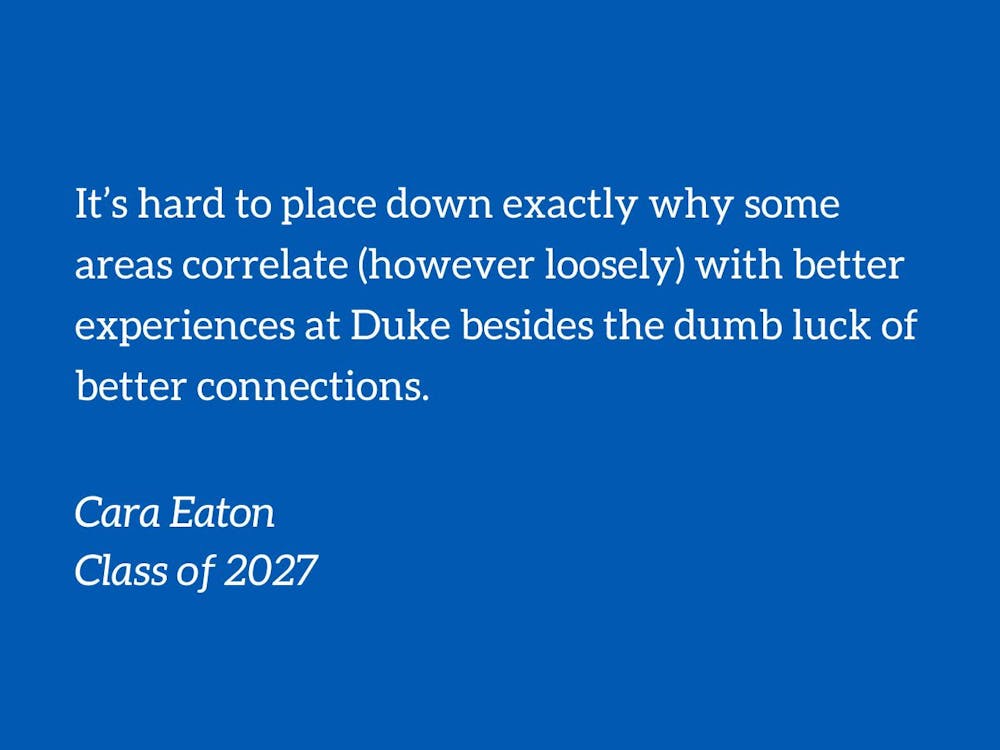If I were a director with some absurdist quality to my work (à la Charlie Kaufman) and I were to create some satirical depiction of Duke admissions, I’d film them drawing a map of the U.S.. The camera would pan in to show that they’ve penciled the entire country as a series of key cities and towns: New York, L.A., Westchester, the entire state of New Jersey … I think New England, my home region, would be represented by a few elite boarding schools that funnel students to Duke, and maybe also Greenwich, Connecticut. (Although anyone up there will tell you that’s not really New England; they’re Yankees fans.)
This is a highly satirical representation of where Duke students are from, since the highest percentage hail from here in North Carolina. Still, it seems as if students from those key elite areas seem to be the most visible. It’s no fault of theirs at all, and there’s no shame in being from a fashionable area. It’s also not Duke’s fault for admitting these highly talented students. The problem, if there is one, is fostered somewhat organically: Students from valued areas seem to have more connections off the bat and better luck moving forward throughout their years at Duke.
It’s quite logical. If you live in a city or area dense with other admitted Duke students, you come in with connections. Localized meetups before freshman year help facilitate these relationships. I believe my meetup, which was for all of New England, took place in Boston. If you live in Boston, easy enough. However, if you’re from the other 99.999% of this 71,988 sq mi area, it may not be as simple. And if you’re from a rural area hours removed from a city, you’re just out of luck.
Or, take the Greek rush process. In my short stint rushing, I was asked what high school I went to after I revealed where I was from. "How would these girls possibly know my high school?" I wondered. Was I not to believe they hoped to hear a famous name? My friend from small-town California, somewhat similarly, was asked if she lived near celebrities. Plenty of others have written about the fetishization of wealth that is embedded in the concept of the Greek system, and that’s not my point of interest.
I’m not even sure wealth is the premier issue here. It’s hard to place down exactly why some areas correlate (however loosely) with better experiences at Duke besides the dumb luck of better connections. The girls interviewing us may have just been looking to relate based on shared experiences of themselves or their friends. A faultless phenomenon. It’s the natural consequence of an admissions system that favors certain high schools or areas for some reason or another and thus unconsciously creates certain ingroups.
Of course, writing about New England like it’s an area lacking in privilege is laughable for the land of Harvard and Yale. On that note, in said universities, I’m sure there’s similar congestion from certain cities and areas, and thus the same cultural issue I describe. The actual demographic distribution is certainly a bit different, as being only one of two in the Class of 2027 from my home state would likely not be the case there, although certain Wyoming-esque areas probably are similar across the board in meager representation.
The goal then here, a populist notion, is to create a Duke (or Harvard, or Yale) that is no less advantaged to the rural public schooler than to the classmate from the Upper East Side. How exactly to undo a deeply ingrained social and cultural occurrence, well, I’ll leave that up to our sociology department.
I can’t leave this article without anticipating protests that socioeconomic inequality is the real issue here, not shallow social indicators like the area of origin. However right you may be, I’ll leave that up to a writer who’s read just a little more Marx than me.
Cara Eaton is a Trinity sophomore.
Get The Chronicle straight to your inbox
Signup for our weekly newsletter. Cancel at any time.

